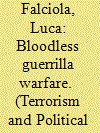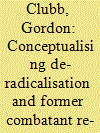| Srl | Item |
| 1 |
ID:
148936


|
|
|
|
|
| Summary/Abstract |
Between 1968 and the late 1970s, a significant number of U.S. white leftist groups escalated their protest to armed struggle. After experimenting briefly with violence, they opted for low-intensity armed propaganda that targeted property and avoided hurting people. By contrast, European leftist groups and anti-colonial organizations in the U.S. made extensive use of antipersonnel violence. Why did U.S. leftists eschew attacks against civilians? Scholarship does not explain this case, as it focuses either on the internal dynamics of a single group or on structural variables. Conversely, this article addresses this question through a historical reconstruction and a multilevel analysis. The research identifies the critique and ensuing de-solidarization by the radical milieu as the main factor accounting for the restraint of violence. This article demonstrates that the radical milieu censored and isolated armed groups as soon as they escalated and began to endanger human lives. Therefore, in order to safeguard the solidarity pact with their constituencies, violent fringes moderated their repertoires of action. This article employs primary sources and original interviews with militants to support this claim and to assess the relevance of three concurrent factors: the trauma generated by the “townhouse incident,” the deterrence by law enforcement, and the militants’ socio-economic background.
|
|
|
|
|
|
|
|
|
|
|
|
|
|
|
|
| 2 |
ID:
163700


|
|
|
|
|
| Summary/Abstract |
Nigeria has recently joined the many states which have established de-radicalisation programmes. The article engages with debates on how the success of de-radicalisation can be ascertained given the substantial flaws of using individual-oriented recidivism rates as a measure. Many studies on de-radicalisation emphasise the need to consider the programme’s context to facilitate success, yet ‘context’ has been under-conceptualised and approached statically. The paper provides greater agency to ‘the context’ in distinguishing between the type of milieus former combatants are re-integrated into and how these emergent social relations shape the scope of de-radicalisation programmes, beyond the traditional over-emphasis on programme participant outcomes as measures of success. The Nigerian de-radicalisation programme has a broader function insofar as it provides former combatants with ‘scripts’ of disengagement and function as a brand, signalling to communities that former combatants have repented and are ‘better citizens, imbued with genuine nationalism’ that resonate with local communities.
|
|
|
|
|
|
|
|
|
|
|
|
|
|
|
|